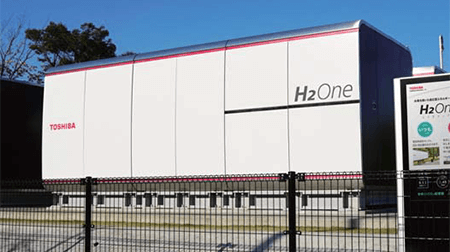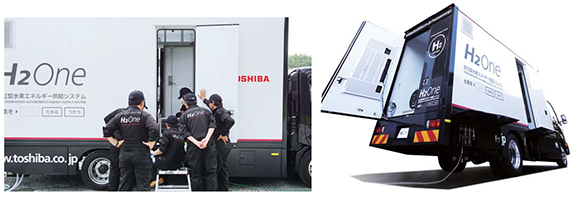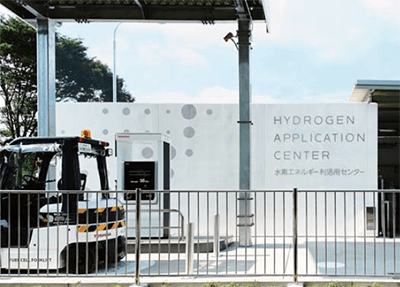The Promise of Next Generation Energy: Toshiba's Hydrogen Solution
As India promotes renewables, one next-generation option attracting attention is hydrogen, a clean, carbon-free energy. The Ministry of New and Renewable Energy is supporting research, development and demonstration projects covering various aspects of hydrogen energy, including its production, storage and use as a fuel for power generation. A breakthrough in hydrogen could be a game-changer for India's future energy.
After many years of research and development, hydrogen systems are now being introduced in Japan, a development that is attracting attention and inquiries from around the world.
Early adopters securing disaster readiness

The Great East Japan Earthquake brought down lifelines across a wide swathe of Japan, and left a deep awareness of the need for communities to take effective measures in response to emergencies and disasters. When Kawasaki, one of Japan's largest cities, set up an evacuation center in a recreational facility, the solution they chose was Toshiba H2OneTM, which is able to provide 300 evacuees with power and hot water for a week. Not only that, because hydrogen is a clean, carbon-free fuel, the only by-product of power generation is oxygen.
H2OneTM is a hydrogen-based autonomous energy supply system. The set-up is housed in a single container and combines a renewable energy unit, storage batteries, hydrogen-producing water electrolysis equipment, hydrogen and water storage tanks, and fuel cells. Power generated with renewable energy is stored in the battery, ready to electrolyze water and produce hydrogen when needed, day or night. The hydrogen is in turn stored in a highly efficient tank, for delivery to fuel cells that produce electricity and hot water.

Another H2OneTM is demonstrating the concept of an eco-station at a commuter-line station operated by the East Japan Railway Company near Tokyo. In everyday use it helps to light up the station, but during emergencies it's a source of emergency power and lighting.
H2OneTM can also be used in the field. A truck-mounted unit was put to the test earlier this year in a major disaster response exercise, supporting a Disaster Medical Assistance Team-the first-responders who provide on-site treatment in the crucial acute phase immediately following a disaster, when lifelines are down. The H2OneTM performed flawlessly. In addition to heat and electricity, the delivery of hot water was an additional plus for doctors involved in the emergency operation. The system also offered two immediately noticeable advantages over diesel generators: no noise and no smell.
Solution for renewables
While it has already shown its potential in disaster recovery and business continuity planning, some of the strongest expectations for hydrogen energy are linked to boosting the use of renewable sources. Electricity generated by renewables can be stored in the form of hydrogen, which resolves instability of renewable energy and can expand its use.
Hydrogen is suitable for long-term storage as it does not degrade or lose capacity while stored-hydrogen made summertime with surplus solar power can be stored for use in winter, when there is a lack of solar energy. H2OneTM also has a sophisticated hydrogen energy management system, H2EMSTM, that integrates a weather forecast function, allowing maximization of renewable energy management efficiency.
In future, as it expands in capacity and efficiency, hydrogen could well supply energy in off-grid areas, or the whole energy requirement of large facilities-with zero emissions.
Widening the scope of hydrogen energy

Toshiba continues to promote advances in hydrogen know-how. At the Hydrogen Application Center at its Fuchu facility in Tokyo, it showcases totally CO2-free operation, from hydrogen production through to application, and uses the generated energy to power fuel-cell forklifts. The convenience of being able to fill-up in as short a time as 3 minutes expressly caters to the need for extended vehicle availability in places like factories, warehouses and airports.
The system is also controlled by H2EMSTM, with a new hydrogen demand prediction function that forecasts supply requirements for each fuel-cell-powered vehicle. This secures space saving optimization of the area devoted to hydrogen storage.
With each new project and order won, Toshiba widens the scope of hydrogen energy and helps to prove its potential as a real-world solution. As the company continues to make advances, it looks forward to contributing to a low-carbon future where hydrogen plays a crucial role in power generation.
FOR THE NEXT INDIA


